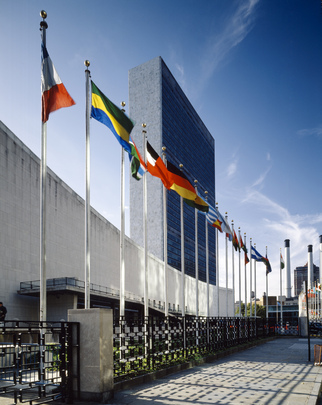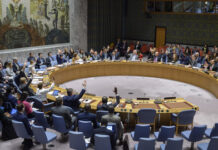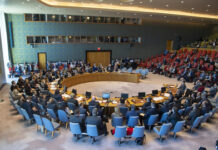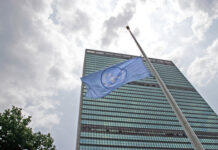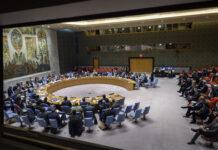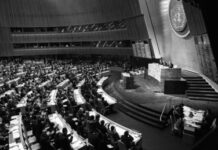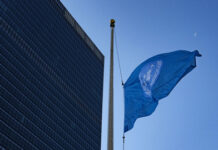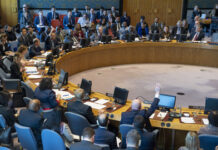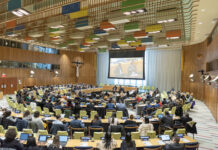UN News: Can you tell us the circumstances that led to IIMM’s creation?
Nicholas Koumjian: The IIMM was created following the crisis of the clearance operations in 2017 that led to about three quarters of a million Rohingya fleeing the country, to Bangladesh where they remain today in refugee camps.
UN News: And what sets the mechanism apart from other independent entities like the Special Rapporteur on Myanmar or UN offices like OHCHR?
Nicholas Koumjian: We have a very specific mandate. Our mandate is to collect evidence of the most serious international crimes committed in Myanmar since 2011. And then to prepare files that could facilitate criminal prosecution. Though we are not a reporting mechanism, our purpose is not to give advice to States about how to treat the problems of Myanmar. Rather, it is to look at the individuals criminally responsible for what happened.
And it is based on the fact that many observers of Myanmar have recognized that a lot of the problems go back to the fact that, for decades, the authorities – particularly the military in Myanmar, has gotten away with very bad behavior, with crimes without any accountability.
So, there is a recognition that if we really want to treat the root problem then there is a necessity to bring accountability.
UN News: Without going into the specifics, can you tell us what kind of allegations you are investigating and how these have evolved since the military coup of 2021?
Nicholas Koumjian: Well, our mandate is to collect evidence of the most serious international crimes. And international crimes are defined as war crimes, crimes against humanity and genocide. So the crimes that we concentrate on are the most serious. And there are issues in some cases about individual killings. Are they part of a larger armed conflict where they could qualify? So there are, sometimes we have to look at all the context to see if a particular incident falls within our mandate or not. But what we are concentrating on is we have one team that that works in the Rohingya about what happened in 2012, 2016 and 2017.
Each of those times there were military operations that led to large numbers fleeing the country. And the other half of the team looks at everything else, which mainly means concentrating. Now on the post-coup violence. The February 2021 coup occurred and that itself, as we said at the time, was not within our mandate. Our mandate is not fair. Elections and constitutional and unconstitutional change, it is limited to these serious crimes. But we said we would be watching based on the history of Myanmar and unfortunately the history of political violence repeated.
And we see indications of a widespread and systematic attack on a civilian population. The other team, what we call team one, has spent most of its efforts, collecting evidence of this post-coup violence.
UN News: You said you are looking at a lot of allegations concerning the State forces. Are you also looking at the non-state side?
Nicholas Koumjian: Absolutely. Our mandate is crimes and it doesnot matter what the ethnicity, religion, or citizenship of the victims are or the perpetrators, but they do have to qualify as among these most serious international crimes. So we are looking at for example, in the post-coup situation many allegations and sometimes there are pretty good indications that individuals were targeted because they were suspected to be informants. But it appears that these were non-combatants. They were civilians at the time, and under the laws of war, they cannot be targeted. So we are looking at those to see if they would amount to an international crime within our mandate. Again, not all killings are within our mandate.
UN News: The mechanism has not been able to visit Myanmar in this situation. How are you gathering evidence and conducting your investigations?
Nicholas Koumjian: Well, it requires, for us to be as innovative as possible. And part of what we do is using new technologies. Anything from aerial photographs of villages you can see how they looked before and after an attack, before and after they were burned arsons. But also looking at things like social media and examining those and using modern technologies to search through vast numbers of documents. For the most relevant evidence, we have collected over 20 million items of evidence, individual photographs, textual post of a few words, or it could be a 500 page document and videos.
It is a challenge to be able to review those to find what is relevant. So we are trying to use all these new technologies and innovations. We do speak to people; we try to speak directly to those who saw and heard events. Obviously, that is very difficult when we cannot go to Myanmar, but there are many individuals now outside the country. We try to work with different countries to allow us to operate on their territory, to do these interviews and collect this evidence.
UN News: How can you ensure that the evidence you are collecting will help ensure individuals and entities are held accountable?
Nicholas Koumjian: Well, you know, our mandate is to collect the evidence and then prepare files for courts. And what we cannot control is what courts are able and willing to use the evidence. When we were created, it was to collect and preserve. And I think there was a recognition that which is true, that international justice is very slow but that things can change. Before I worked in Myanmar, I worked at the KH Rouge Tribunal in Cambodia. And when I left, the year I left, we got convictions against two of the top leaders of the Khamer Rouge, the former number two in the regime, the former head of state for crimes that they had that had been completed 40 years earlier.
Now, that 40 years is way too long to wait for justice. But it is important to preserve evidence so that it can be used in courts one day.
And ideally one day these will be used in courts, in Myanmar courts that could give fair trials that are really interested in objectively looking at the evidence and holding to account those responsible. But in the meantime, there is also the possibility of sharing this with international courts or with national courts that may exercise some form of universal jurisdiction. And we are currently sharing with three different processes. One is the International criminal court, which is investigating the situation of the Rohingya and what happened to them.
Another is the federal courts in Argentina, some Rohingya who lived in the United Kingdom and were currently refugees in Bangladesh, filed a complaint with the courts of Argentina, even in that country is halfway around the world. And there was no link to Argentina. Appellate court there said that the courts have to investigate that complaint because these are crimes against humanity, which means it affects everyone. Their courts were obligated under their constitution to investigate. So we are providing evidence, sharing our evidence with that court to try to assist them in their obviously very complicated, difficult investigation.
And then finally, there is a case at the International Court of Justice. This is not a criminal case, but it is a case where The Gambia has alleged that Myanmar has failed to fulfill its obligations under the convention for the prevention of genocide. Both Gambia and Myanmar have signed that convention many years ago, and that convention puts obligations on States to prevent genocide, to punish it.
And in that case the proceedings are ongoing. The court has ruled that it does have jurisdiction. The parties are still filing written motions, which should be completed by the end of next year. And probably in 2025 they will actually proceed to the court hearings on the merits of the case.
So that is, I think we think a very important case for Myanmar. But of course, any ruling by the International Court of Justice, which is the highest court of the United Nations can have effects on everyone around the world. So, we think it is important that the judges in that case have the very best evidence of what would actually occurred.
We are trying to share our evidence with the, um, with that proceedings so that it can benefit and ultimately we hope a, a verdict that would help bring some justice.
UN News: In your opinion, what are the most significant obstacles to achieving justice and accountability in Myanmar?
Nicholas Koumjian: Well, I think the, the biggest obstacle is the lack of cooperation. I mean, ideally, we would be going to crime scenes, we would be speaking to the victims. We would also be speaking to the people that are alleged to be perpetrators or were in the same units of the forces that committed or alleged to have committed crimes. And that is how you would normally do a criminal investigation. We cannot do that in this situation, so we have to, compensate by, for example, going to neighboring countries or talking to witnesses in different places around the world.
What we need is a cooperation of states to allow us to carry out that work. We, of course, need the resources to be able to do this. It is not easy because we are based in Geneva and so a lot of, to speak to people, we have to travel. That is expensive, but it is necessary in these circumstances.
UN News: Before we conclude, would you like to add anything from your side?
Nicholas Koumjian: I would just like to say to the people of Myanmar, to the victims of these crimes that we recognize how much they want to see some justice, they want to see. I have talked to victims from Myanmar and they are similar to victims I talked to from Cambodia or Darfur or Bosnia and Sierra Leone, places that I have worked before. And what victims generally want is they want a recognition by a court that these crimes really happen to them, and they want to see the persons who are responsible held to account some recognition that they were responsible.
We are working. We hope for one day to achieve that justice. And we ask for your, for your patience and cooperation. And we will do our best to achieve that.
Source of original article: United Nations (news.un.org). Photo credit: UN. The content of this article does not necessarily reflect the views or opinion of Global Diaspora News (www.globaldiasporanews.com).
To submit your press release: (https://www.globaldiasporanews.com/pr).
To advertise on Global Diaspora News: (www.globaldiasporanews.com/ads).
Sign up to Global Diaspora News newsletter (https://www.globaldiasporanews.com/newsletter/) to start receiving updates and opportunities directly in your email inbox for free.


